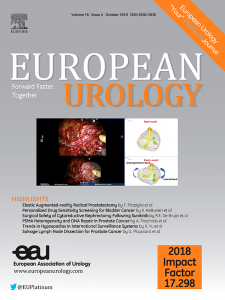Pembrolizumab Retreatment in Patients with Advanced or Metastatic Urothelial Carcinoma Who Responded to First-course Pembrolizumab-based Therapy
IF 25.2
1区 医学
Q1 UROLOGY & NEPHROLOGY
引用次数: 0
Abstract
Patients with metastatic solid tumors who previously had stable disease or a response with immunotherapy may derive benefit from immunotherapy retreatment. This post hoc analysis evaluated pembrolizumab retreatment in patients with advanced/metastatic urothelial carcinoma who received pembrolizumab in KEYNOTE-045, KEYNOTE-052, or KEYNOTE-361, and either stopped pembrolizumab after a complete response (CR) or completed pembrolizumab (35 cycles [∼2 yr]) with an objective response or stable disease. Upon disease progression, protocol-specified pembrolizumab retreatment (200 mg intravenously every 3 wk) was administered for ≤17 cycles. Forty-nine patients met the criteria and were included. The median follow-up was 24.4 mo (range, 1.4–53.5). The median time between first-course therapy cessation and pembrolizumab retreatment was 10.7 mo (1.0–36.3). Twenty patients (41%) had an objective response with pembrolizumab retreatment, 65% of whom had a CR to first-course treatment. The median retreatment duration was 8.3 mo (range, 0.0–13.2); the median duration of response was 14.0 mo (2.1+ to 20.5). From retreatment initiation, the median (95% confidence interval) progression-free survival and overall survival were 9.5 mo (5.6–15.0) and 25.7 mo (21.5–27.5), respectively. Treatment-related adverse events occurred in 45% (grade 3–4: 6%; grade 5: 0%). Data suggest that pembrolizumab retreatment is beneficial and tolerable for some patients with advanced/metastatic urothelial carcinoma who previously had a CR or completed 2 yr of pembrolizumab.
对以派姆单抗为基础的治疗有反应的晚期或转移性尿路上皮癌患者的再治疗
既往病情稳定或免疫治疗有应答的转移性实体瘤患者可从免疫治疗再治疗中获益。这项回顾性分析评估了晚期/转移性尿路上皮癌患者的派姆单抗再治疗,这些患者在KEYNOTE-045、KEYNOTE-052或KEYNOTE-361中接受派姆单抗治疗,在完全缓解(CR)后停止派姆单抗治疗,或在客观缓解或疾病稳定的情况下完成派姆单抗治疗(35个周期[~ 2年])。在疾病进展时,给予方案指定的派姆单抗再治疗(每3周静脉注射200 mg),疗程≤17个周期。49例患者符合标准并被纳入研究。中位随访时间为24.4个月(范围1.4-53.5)。从第一疗程结束到重新接受派姆单抗治疗的中位时间为10.7个月(1.0-36.3)。20名患者(41%)对派姆单抗再治疗有客观反应,其中65%的患者对第一疗程治疗有CR。中位再治疗时间为8.3个月(范围:0.0-13.2);中位缓解持续时间为14.0个月(2.1+至20.5个月)。从重新治疗开始,中位(95%置信区间)无进展生存期和总生存期分别为9.5个月(5.6-15.0)和25.7个月(21.5-27.5)。治疗相关不良事件发生率为45%(3-4级:6%;5级:0%)。数据表明,对于一些先前有CR或完成2年派姆单抗治疗的晚期/转移性尿路上皮癌患者,再治疗派姆单抗是有益的和耐受的。
本文章由计算机程序翻译,如有差异,请以英文原文为准。
求助全文
约1分钟内获得全文
求助全文
来源期刊

European urology
医学-泌尿学与肾脏学
CiteScore
43.00
自引率
2.60%
发文量
1753
审稿时长
23 days
期刊介绍:
European Urology is a peer-reviewed journal that publishes original articles and reviews on a broad spectrum of urological issues. Covering topics such as oncology, impotence, infertility, pediatrics, lithiasis and endourology, the journal also highlights recent advances in techniques, instrumentation, surgery, and pediatric urology. This comprehensive approach provides readers with an in-depth guide to international developments in urology.
 求助内容:
求助内容: 应助结果提醒方式:
应助结果提醒方式:


